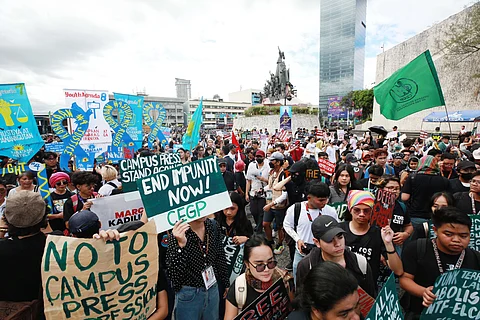
- NEWS
- the EDIT
- COMMENTARY
- BUSINESS
- LIFE
- SHOW
- ACTION
- GLOBAL GOALS
- SNAPS
- DYARYO TIRADA
- MORE

President Ferdinand Marcos Jr. was not attempting to erase the memory and significance of the 1986 People Power Revolution following his declaration of 25 February as a special working day, Malacañang said yesterday.
The historic event marked the end of the 20-year strongman rule of his father, the late former President Ferdinand Marcos Sr.
“Let’s take a look at it; how can history be erased? History is history. So, the President cannot just erase this from our history,” said Palace press officer Undersecretary Claire Castro.
“Has the President stopped any activity related to the commemoration of EDSA People Power? Since he became president, we have not heard of any stopping of events or activities to commemorate the event,” she said.
Castro said the decision to declare 25 February a working day was the President’s prerogative, noting that he did not hinder any activities honoring the historic occasion.
“When we say special working day, there is still an encouragement for people to commemorate and join events. It is not hindering any activities to commemorate the EDSA People Power anniversary,” she said.
She said that universities and other institutions were free to organize commemorative activities.
“They have the freedom to do that. That’s why we’re saying that the President is not obstructing any plans of any organization or university. So, if they really planned to suspend classes, it was up to them. They’re free to do that,” Castro said.
Malacañang has not issued a statement on the 39th anniversary of the People Power Revolution, with President Marcos’s most recent message on the occasion issued in 2023 when he called for “peace, unity, and reconciliation.”
This year the 1986 People Power Revolution was commemorated with a more subdued observance, with the National Historical Commission of the Philippines (NHCP), the Quezon City government, and the EDSA People Power Commission hosting a modest flag-raising and wreath-laying ceremony at the EDSA People Power Monument on the corner of EDSA and White Plains Avenue in Quezon City.
Quezon City Mayor Joy Belmonte, along with Regalado Trota Jose Jr., chairperson of the NHCP, and Carmelo Victor A. Crisanto, executive director of the Human Rights Violations Victims Memorial Commission (HRVVMC), led the rites.
Representatives of various non-government organizations, including the Spirit of EDSA, Bantayog ng mga Bayani Foundation Inc., August 21 Movement, Chino Roces Foundation, Project Gunita PH, and the Ateneo Martial Law Museum and Library, participated.
Kristoffer Pasion, senior history researcher at NHCP, said this year’s observance was made intentionally simpler, reflecting a more muted approach to the observance.
Pasion said the HRVVMC conducted a program to remember those who suffered under martial law, yet the overall tone of the event was more subdued compared to previous years.
Although Proclamation No. 1 declaring the sovereignty of the people was signed on this day in 1986 by then President Corazon C. Aquino, the mood surrounding this year’s anniversary was quieter.
The 1986 revolution, which ousted the authoritarian regime of Ferdinand Marcos Sr. and brought Corazon Aquino, the widow of the assassinated senator Benigno “Ninoy” Aquino Jr., to power, remains one of the most significant moments in the country’s history.
The anniversary is typically a time to reflect on the values of democracy, justice, and freedom, though this year it was marked by quieter reflection and a sense of introspection about the unfinished journey toward these ideals.
The muted nature of this year’s commemoration contrasted with the vibrant and passionate celebrations of previous years, but it served as an opportunity to reflect on the ongoing struggles for human rights and the promise of EDSA that continues to inspire change in the Philippines.
On the 39th anniversary of the EDSA Revolution, Catholic leaders reflected on its moral and spiritual significance.
In a statement signed by over 100 church leaders, the One Faith One Nation One Voice group emphasized that the victory at EDSA was a “moral and spiritual awakening,” highlighting courage, compassion, and solidarity in the fight for democracy.
The leaders urged Filipinos to continue the EDSA spirit by committing to social transformation and fighting corruption, disinformation, and oppression. They stressed the importance of acting in faith to build a nation of justice and peace.
The Conference of Major Superiors in the Philippines (CMSP) paid tribute to those who fought against dictatorship, acknowledging the sacrifices of martyrs and heroes in the anti-dictatorship struggle. However, the CMSP also pointed out ongoing challenges such as rights violations, corruption and climate change.
In this year of Jubilee, the CMSP reminded the faithful that true change lies within, urging the nation to overcome patronage and corruption and build a society based on justice and faith.
